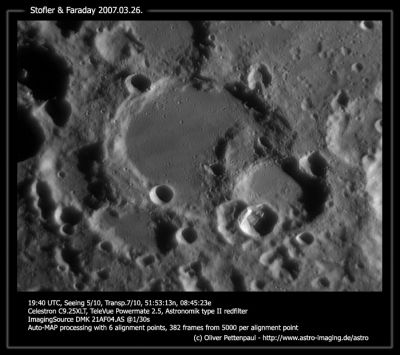Faraday
Contents
Faraday
|
Lat: 42.4°S, Long: 8.7°E, Diam: 69 km, Depth: 4.09 km, Rükl: 66 |

Oliver Pettenpaul
Faraday is the smaller crater that overlaps Stöfler.
Images
LPOD Photo Gallery Lunar Orbiter Images Apollo Images
Maps
(LAC zone 112C2) LAC map Geologic map
Description
Description: Elger
(IAU Directions) FARADAY.--A large ring-plain, about 35 miles in diameter, overlapping the S.E. border of Stöfler; its own rampart being overlapped in its turn by two smaller ring-plains on the S.W., and by two still smaller formations (one of which is square-shaped) on the N.E. The wall is broad and very massive on the W. and N.W., prominently terraced, and includes many brilliant little craters. Schmidt shows a ridge and several craters in the interior.
Description: Wikipedia
Additional Information
Depth data from Kurt Fisher database
- Westfall, 2000: 4.09 km
- Viscardy, 1985: 4.09 km
- Cherrington, 1969: 2.28 km
- Faraday C mapped as Copernican by USGS.
- In august 2014 Patricio Leon (Nunki) discovered the remarkable appearance of a lion's head on the chaotic interior floor of Faraday C. This curious appearance is always noticeable when the western interior slopes (of Faraday C) are in darkness, such as in the WAC-mosaic of the LROC's ACT REACT Quick Map.- DannyCaes Aug 15, 2014
Nomenclature
- Michael Faraday, FRS (September 22, 1791 – August 25, 1867) was an English chemist and physicist who contributed significantly to the fields of electromagnetism and electrochemistry. Faraday studied the magnetic field around a conductor carrying a DC electric current, and established the basis for the magnetic field concept in physics. He discovered electromagnetic induction, diamagnetism and electrolysis. He established that magnetism could affect rays of light and that there was an underlying relationship between the two phenomena. His inventions of electromagnetic rotary devices formed the foundation of electric motor technology.
- Faraday G was called Reypastor by Hugh Percy Wilkins and Antonio Paluzie-Borrell, but the IAU did not accept that name.
- * Julio Rey Pastor (Wikipedia)was a Spanish astronomer (1888-1962).
LPOD Articles
Bibliography
Faraday G ("Reypastor"): Wilkins and Moore.